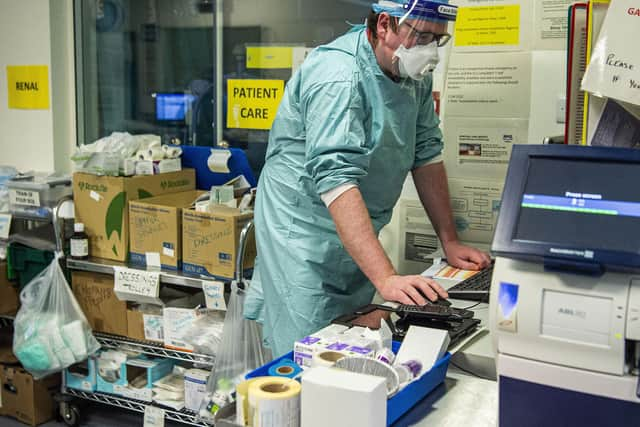Covid Scotland: 240 Scots die as a result of delays at A&E departments
Mr Yousaf issued the warning as he apologised for the “suffering and inconvenience” caused as health boards face their most challenging time in history.
Covid hospitalisations reached a new record for the fourth day in a row on Wednesday, at 2,322.
Advertisement
Hide AdAdvertisement
Hide AdSome 240 Scots have died already this year as a result of delays at A&E departments, the Royal College of Emergency Medicine (RCEM) said, after the number of people waiting more than four, eight and 12 hours hit record highs earlier this week.


Dr John Thomson, vice-president of the RCEM in Scotland, said “unacceptable and avoidable” harm was coming to patients in Scotland.
"That is simply patients on trolleys in our emergency departments around Scotland waiting for a bed,” he told the BBC. "This is beyond doubt the biggest crisis that we have faced in emergency care."
Health boards have begun cancelling further elective operations as they struggle to cope with high demand and increased staffing shortages.
In a statement to the Scottish Parliament on Wednesday, Mr Yousaf thanked health and social care staff for their work, and apologised to those affected by longer waiting times.
The Scottish Conservatives accused Mr Yousaf of giving the public a “list of excuses” for the current strain on the NHS, while Scottish Labour said the health secretary was playing “fast and loose” with the lives of Scots, and demanded he come up with more than “sticking plaster solutions”.
The pressures are due to record numbers of people in hospital with Covid, higher attendance at A&E, time-consuming infection prevention and control (IPC) measures, high numbers of delayed discharges and longer stays in hospital, Mr Yousaf said, alongside widespread staff absences.
He reiterated Scottish Government plans to increase the workforce. Mr Yousaf said the four nations were seeking an “exit strategy” from current Covid IPC measures, which may relieve pressure.
Advertisement
Hide AdAdvertisement
Hide AdThese IPC measures include enhanced deep-cleaning and a block on patients accessing normal transport, making it more difficult to move patients through hospitals and to free up beds.
Mr Yousaf said: “To patients and those who have in any way been either inconvenienced or are suffering because of the current pressures, I have no hesitation in apologising for that suffering and for that inconvenience, and I appreciate the patience that every person is showing at this extremely challenging time.”
He added: "Today there are 2,322 Covid patients in our hospitals.
"That number has more than doubled since February. It is now past the previous peak of last winter when we had 2,053 patients in hospital with Covid in January 2021.
"Using the latest published Covid-19 modelling we anticipate this may well continue to increase over the next couple or few weeks.”
The increase in hospitalisations is largely due to the more transmissible BA.2 subvariant of Omicron, Mr Yousaf said, which is believed to account for around 90 per cent of cases in Scotland.
Royal College of Nursing Scotland director Colin Poolman said members were exhausted, with six in ten thinking about leaving their jobs.
"It is not sustainable to be running services with so many vacancies, rising absences due to Covid and a burnt-out workforce,” he said. “In the statement, the Cabinet secretary rightly pointed out all of the problems, but what nursing staff working across health and social care need are solutions.”
Advertisement
Hide AdAdvertisement
Hide AdScottish Conservative health spokesperson Sandesh Gulhane said the health secretary’s “lack of workforce planning” and “flimsy Covid recovery plan” had led to the existing crisis.
“What immediate, tangible help will you be giving to A&E departments?” he asked, adding: “I fear that you are making excuses here and there is nothing to actually tackle the problem.”
Labour’s Jackie Baillie also accused the health secretary of a lack of action.
“I welcome the Cabinet secretary’s statement, but I do look forward to a time when he is not just commenting on the context or how bad the problem is, but that he is actually taking action,” she said.
“The number of patients waiting at A&E is at an all-time high … that is assuming you can get to A&E, if you can get your call answered by NHS 24, and if you can get an ambulance to show up.
“I thank the staff who are working tirelessly, but they are being let down by this government.
“Everyone is waiting for this Cabinet secretary to do something, but all he has are the answers he gave in October 2021. These initiatives have not worked.”
A&E waiting times performance reached the second-worst on record in the week to March 13, with just 68 per cent of patients admitted, transferred or discharged within four hours. The Scottish Government target is 95 per cent.
Advertisement
Hide AdAdvertisement
Hide AdThe highest number of people waited over four, eight and 12 hours since records began in February 2015.
Dr Thomson said there was "clear evidence that long waits in emergency departments are directly associated with patient death".
He said: "The rhetoric of, it's bad but we're not as bad as elsewhere, is no longer applicable. We are just as bad as the rest of the UK."
Mr Yousaf stressed the NHS had seen record levels of funding, with £18 billion set aside for health and social care in 2022/23.
He said the best tool for NHS recovery is keeping Covid under control.
A message from the Editor:
Thank you for reading this article. We're more reliant on your support than ever as the shift in consumer habits brought about by coronavirus impacts our advertisers.
If you haven't already, please consider supporting our trusted, fact-checked journalism by taking out a digital subscription.
Comments
Want to join the conversation? Please or to comment on this article.
